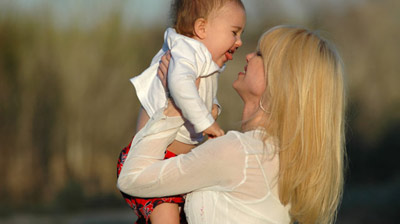|
 Women with lots of children might be stressed but they are less likely to commit suicide, according to a Taiwanese study that found the more children a woman has, the lower her suicide risk. |
|
Women with lots of children might be stressed but they are less likely to commit suicide, according to a Taiwanese study that found the more children a woman has, the lower her suicide risk. A long-standing theory that historically lower suicide rates seen among married versus unmarried women reflects a "protective effect" of motherhood, rather than advantages of marriage per se. Researchers at Kaohsiung Medical University in Taiwan said this latest study supported that theory. The study looked at 30 years of data on 1.3 million Taiwanese mothers and found that women with two children were 39 percent less likely than those with one child to commit suicide. Researcher Dr. Chun-Yuh Yang said that the risk was 60 percent lower among women with three or more children. The study, reported in the Canadian Medical Association Journal, was based on birth and mortality records for Taiwanese women who had their first child between 1978 and 1987. Yang followed death rates for the study group through 2007. Suicide was uncommon regardless of the number of children the women had. Among women with one child, there were 11 suicides per 100,000 women per year. That rate was seven per 100,000 among women with two children, and just under six per 100,000 among mothers with three or more children. When Yang factored in a number of other variables -- including the women's age at first birth, marital status and education level -- the number of children a woman had remained linked to suicide risk. Yang said it was possible that women with a large brood of children benefit from greater emotional or material support when times are tough. Women who have several children also spend a larger share of their lives caring for young children compared with mothers who have one child. He said mothers who feel "needed" may be less vulnerable to suicide. However, Yang added that it was also likely that women who are already more vulnerable to suicide -- because of serious depression or other psychiatric illnesses -- tend to have fewer children. Although the current study included only Taiwanese women, Yang said the findings were likely relevant to other countries with studies conducted in Norway, Denmark and Finland finding a similar relationship between a woman's number of children and her risk of suicide. (Read by Nelly Min. Nelly Min is a multimedia journalist at the China Daily Web site.) (Agencies) |
生养孩子多的女性可能会感到很累,但与此同时,这些女性自杀的可能性也较低。台湾的一项最新研究发现,女性生养的孩子越多,自杀风险越低。 长期以来的理论表明,从历史上看,已婚女性的自杀率低于未婚女性,这反映出“母亲”这一身份的“保护性效应”,而并非是婚姻本身。 台湾高雄医科大学的研究人员称,这一最新研究为这一理论提供了支持。 该研究对三十年来台湾130万名母亲的数据资料进行了分析,发现有两个孩子的女性比只有一个孩子的女性的自杀风险低39%。 研究人员杨俊毓博士说,有三个或三个以上子女的女性的自杀可能性低60%。 这一研究在《加拿大医学协会期刊》上发表,该研究基于1978年至1987年间台湾生育第一个孩子的女性的生卒记录。杨俊毓于2007年对研究对象的死亡率数据进行了跟踪调查。 研究发现,无论女性生养几个孩子,自杀现象并不普遍。 在育有一个孩子的女性中,每年每10万人中有11人自杀;在育有两个孩子的女性中,每10万人中有7人自杀;而在有三个或三个以上孩子的女性中,这一数字不到6个。 杨俊毓还考虑了其他一些可变因素,包括女性生第一个孩子时的年龄、婚姻状况和教育水平,结果发现女性所生养孩子的数量仍然和自杀风险有关。 杨俊毓说,这可能是因为孩子多的女性在困难的时日里能得到更多的情感或物质支持。而且与只有一个孩子的女性相比,有多个孩子的女性要花更多的时间来照顾小孩。 他说,感到自己“被需要”的母亲不容易出现自杀倾向。 但他说,也有可能是因为那些原本就有自杀倾向的女性生养孩子较少,比如患有严重的抑郁症或其他精神疾病的女性。 尽管目前的这项研究只涉及台湾女性,但杨俊毓说这些发现与其他国家的研究发现存在关联。在挪威、丹麦和芬兰开展的研究也发现,女性生养的孩子的数量和她们的自杀风险之间存在类似的联系。 相关阅读 (中国日报网英语点津 陈丹妮 编辑蔡姗姗) |
|
Vocabulary: per se: used meaning ‘by itself’ to show that you are referring to something on its own, rather than in connection with other things 本身;本质上 factor in: 把……因素包括进去 |
